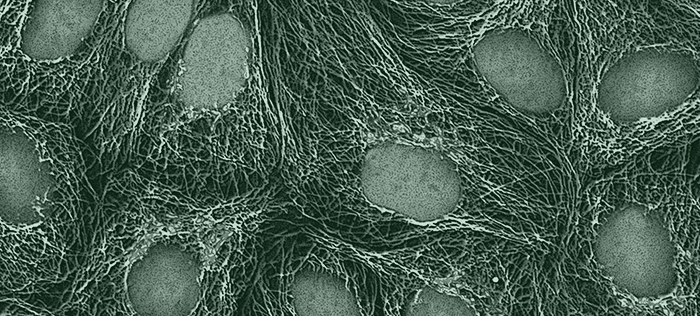
Combatting Disease Through Gene Research
Atherosclerosis, the narrowing of the arteries due to the build-up of plaque, is a primary cause of heart disease and stroke. Unfortunately, there are currently few preventative treatments that can decrease or eliminate this potential killer.
With a grant from the National Institutes of Health (NIH), CSU is investigating the effect of a key enzyme on plaque build-up, which could be central to developing effective genetic therapies for addressing the condition.
Aimin Zhou, professor of chemistry and a faculty member in CSU’s Center for Gene Regulation in Health and Disease (GRHD), received a $445,500 Academic Research Enhancement Award from NIH to improve understanding of how the enzyme RNase L contributes to atherosclerosis in humans.
The data will ultimately be used to create better genetic treatments to reduce the impact of atherosclerosis on cardiovascular health. The effort will build on previous research conducted by Dr. Zhou which indicates decreasing the level of RNase L can lead to an increase in plaque
build-up.
GRHD, launched in 2008, enhances and integrates research focused on gene regulation, leading to better understanding of the molecular mechanisms controlling health and the identification of therapeutic targets for diseases such as cardiovascular disease and cancer. GRHD researchers have made seminal discoveries with the potential to revolutionize treatment options for these afflictions.
In the past 10 years, GRHD research has produced more than 250 journal articles, including prestigious publications in top journals, such as Science, Nature and Cell.
The Center has received over $29 million in external funding from leading national and international agencies, as well as over $3.6 million in private donor support.
In 2016, a CSU alumnus made an anonymous $1 million gift to support GRHD, including establishment of a Pilot Innovation Program to help leverage public and private investment and strengthen the Center’s research portfolio. Through this mechanism, GRHD faculty may seek funding to initiate pilot projects and/or for bridge support of current projects.
To learn more, visit csuohio.edu/research or csuohio.edu/grhd
To date, seven GRHD researchers have received Pilot Innovation awards, helping them in their quest for national funding:
 Valentin Börner, biological, geological and environmental sciences (BGES), to support research on why chromosomes misalign during formation of eggs and sperm. Mistakes during meiosis are a leading cause of birth defects and infertility in humans.
Valentin Börner, biological, geological and environmental sciences (BGES), to support research on why chromosomes misalign during formation of eggs and sperm. Mistakes during meiosis are a leading cause of birth defects and infertility in humans.
 Anthony Berdis, chemistry, to support research that develops more effective treatments for brain cancer by developing better chemotherapy agents.
Anthony Berdis, chemistry, to support research that develops more effective treatments for brain cancer by developing better chemotherapy agents.
 Barsanjit Mazumder, BGES, to support research on a newly discovered cellular switch in immune cells that can turn off inflammation.
Barsanjit Mazumder, BGES, to support research on a newly discovered cellular switch in immune cells that can turn off inflammation.
 Andrew Resnick, physics, to support research on the role of cilia in transducing mechanical forces into intracellular signals.
Andrew Resnick, physics, to support research on the role of cilia in transducing mechanical forces into intracellular signals.
 Xue-Long Sun, chemistry, to support research on development of new antithrombotic drugs for treatment and prevention of thrombotic diseases.
Xue-Long Sun, chemistry, to support research on development of new antithrombotic drugs for treatment and prevention of thrombotic diseases.
 Aimin Zhou, chemistry, to support research on type 1 diabetes by exploring molecular mechanisms controlling immune responses in a mouse strain with compromised interferon response.
Aimin Zhou, chemistry, to support research on type 1 diabetes by exploring molecular mechanisms controlling immune responses in a mouse strain with compromised interferon response.
 Girish Shukla, BGES, to support research on prostate cancer.
Girish Shukla, BGES, to support research on prostate cancer.
To learn more, visit csuohio.edu/research or csuohio.edu/grhd
Also in this Issue...
App Aids Drug Treatment
A team of CSU faculty and students has developed a new web application that will improve access to drug treatment services, reduce wait times and better ensure that individuals get the help they need. Read more >>

